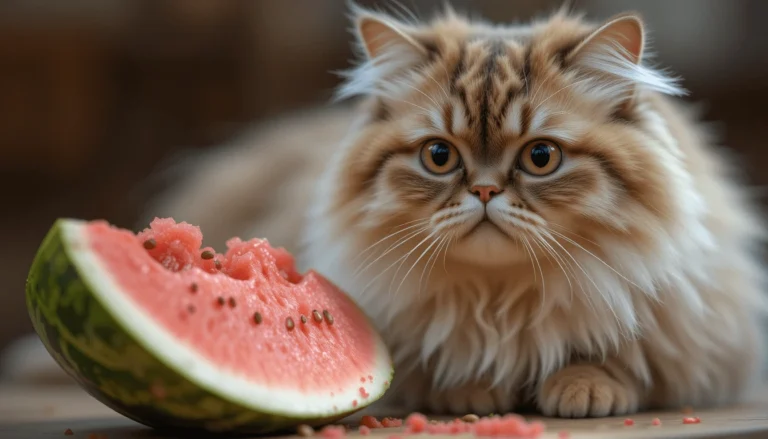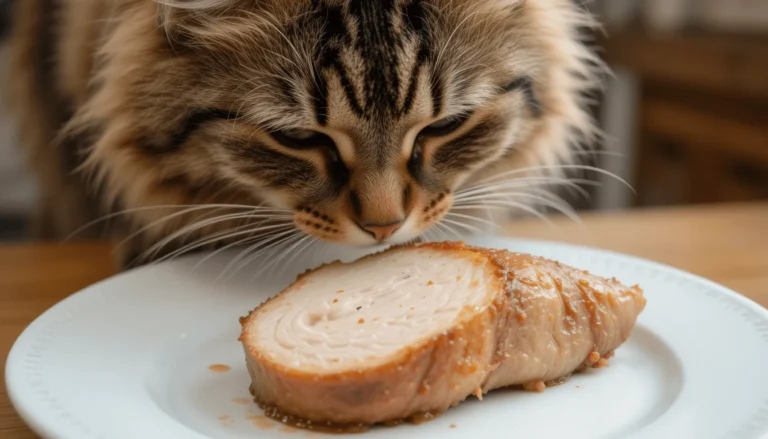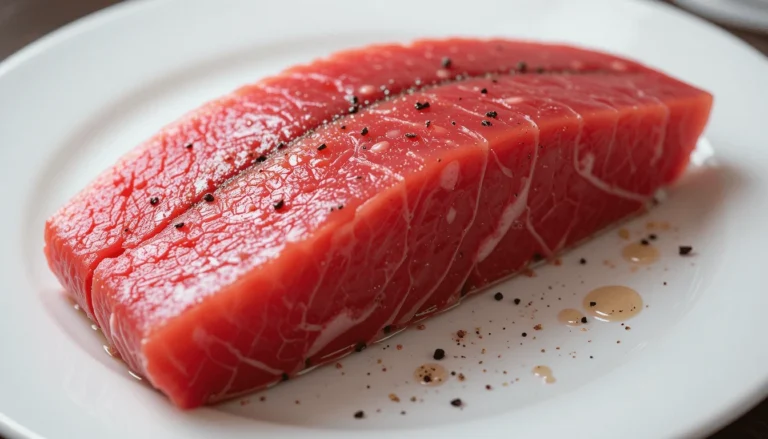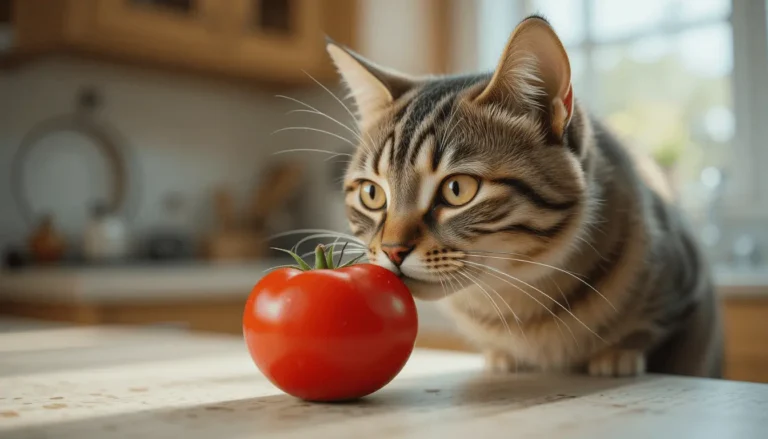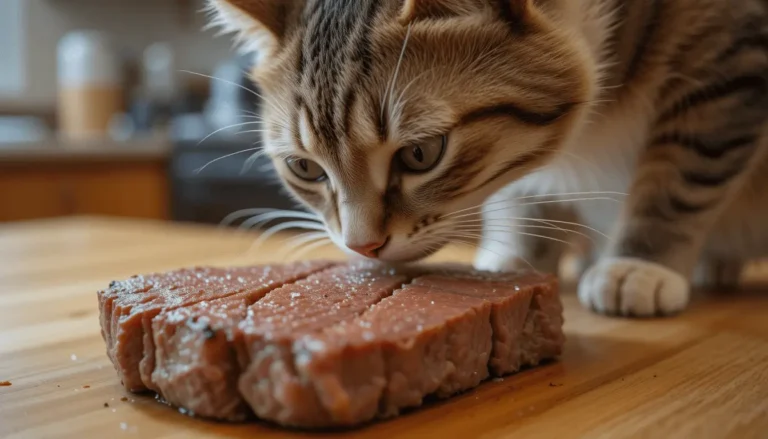Can Cats Eat Scrambled Eggs? What You Need to Know
Introduction
One lazy Sunday morning, as you’re savoring a plate of fluffy scrambled eggs, your curious feline friend leaps onto the counter, eyeing your breakfast with unmistakable interest. You pause—can cats eat scrambled eggs? The thought lingers: Is this a harmless treat or a hidden danger? As a responsible pet owner, it’s natural to wonder which human foods are safe for your whiskered companion. Scrambled eggs, packed with protein, seem like a healthy choice, but the answer isn’t as simple as a yes or no. Let’s crack open the facts and explore what every cat parent needs to know before sharing this common breakfast staple with their furry family member.
Key Takeaways
- Scrambled eggs can be a safe treat for your cat in moderation.
- Protein plays a vital role in your cat’s diet, and eggs provide a good source.
- Ensure eggs are cooked thoroughly without any additives or seasonings.
- Monitor your cat for any signs of allergies or digestive issues when introducing eggs.
- Portion control is essential to maintain a balanced diet for your cat.
Understanding Cats’ Nutritional Needs
To keep your cat healthy and full of energy, it’s key to know what they need to eat. As obligate carnivores, cats require animal-based protein for optimal health. Adding high-quality protein to their diet helps a lot. This is why cats and scrambled eggs can be a good choice for them.
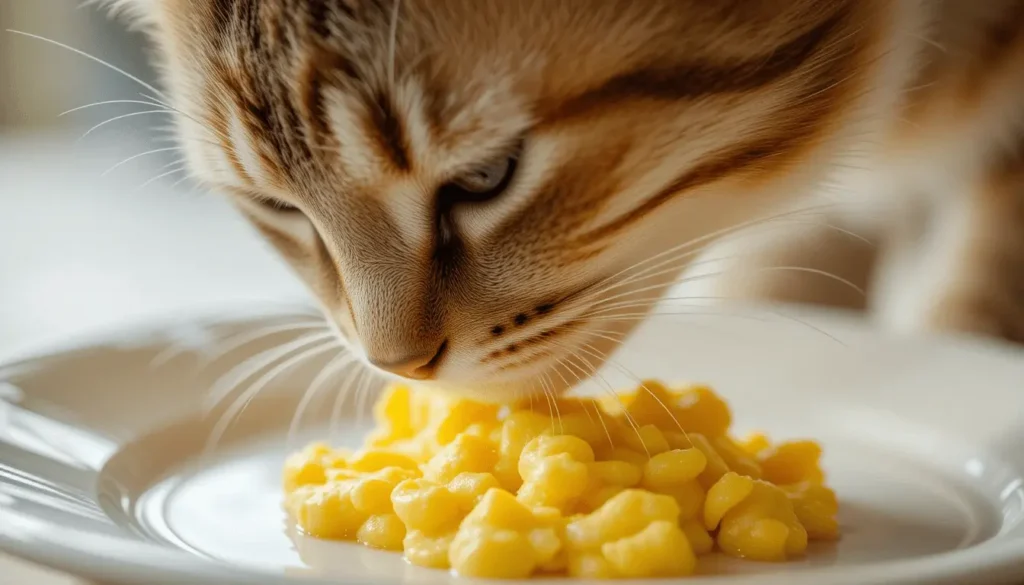
The Role of Protein in a Cat’s Diet
Protein is the cornerstone of a cat’s nutritional needs. It gives them the amino acids they need for many body functions. These amino acids help build and repair muscles and give them energy. Scrambled eggs are a good protein source for cats, but they should not be the only thing they eat.
Essential Nutrients for Feline Health
Along with protein, cats need certain vitamins and minerals to stay healthy. Important ones include:
- Taurine – vital for heart and vision health
- Vitamins A, D, and E are essential for feline immune support, skin/coat health, and bone development.
- Vitamin B12 supports neurological health and erythrocyte formation in cats.
Scrambled eggs can add these nutrients to your cat’s diet. But, they should be part of a balanced diet, not the only food they eat.
| Nutrient | Source | Importance |
|---|---|---|
| Protein | Animal sources, including eggs | Muscle maintenance and energy |
| Taurine | Animal tissues | Heart and vision health |
| Vitamins A, D, E | Eggs and fish | Immune function and bone health |
| B12 | Animal products | Nerve function and blood cell production |
Is It Safe for Cats to Eat Scrambled Eggs?
Feeding cats scrambled eggs can be a good choice if done right. Understanding both the benefits and potential risks is key when considering this food for your cat. This knowledge helps keep your pet healthy and happy.
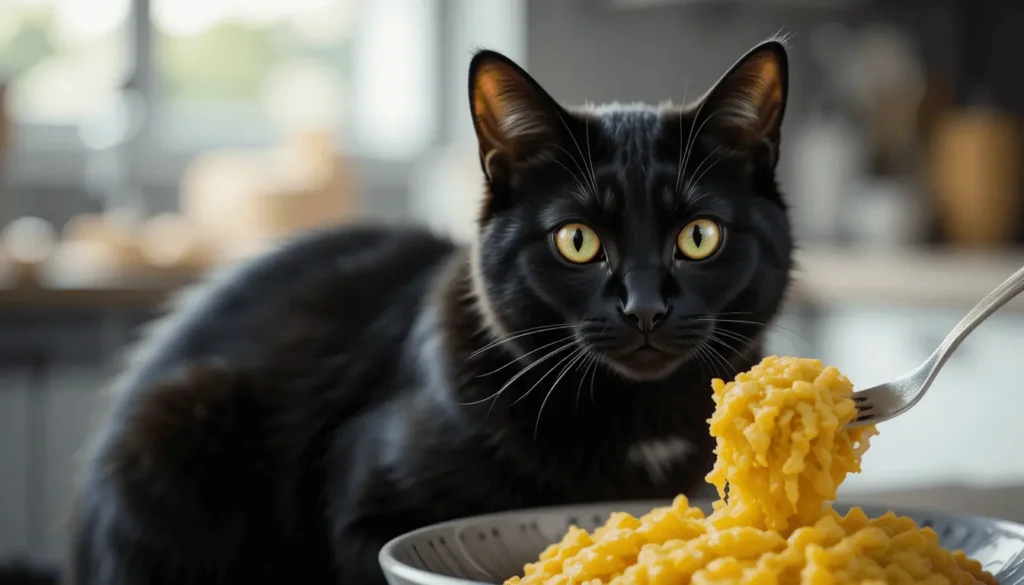
Nutritional Benefits of Scrambled Eggs
Scrambled eggs are full of protein, which is key for your cat’s health. They also have vitamins like B12 and riboflavin. These vitamins help your cat’s energy and overall health.
The egg whites have high-quality protein. The yolks add healthy fats and important nutrients. Adding cooked eggs in small amounts can be good for your cat’s diet.
Potential Risks Involved
But, there are risks to consider. Overfeeding eggs can lead to obesity and nutritional imbalances in cats.. Some cats might also have allergies to eggs.
Also, raw eggs can have harmful bacteria. Always consult your veterinarian before introducing new foods to your cat’s diet to ensure their safety and nutritional balance.
| Benefit/Risk | Description |
|---|---|
| High Protein | Essential for muscle development and maintaining overall health. |
| Vitamins | Contains vital vitamins like B12 important for energy and health. |
| Potential Allergies | Some cats may experience allergic reactions to eggs. |
| Obesity Risk | Feeding too many scrambled eggs can lead to weight gain. |
| Bacterial Contamination | Raw eggs may carry bacteria that can be harmful to your cat. |
Preparing Scrambled Eggs for Your Cat
When you want to treat your cat, making sure the scrambled eggs are safe is key. Cooking the eggs well helps avoid sickness. By using the right ways to cook cat-safe scrambled eggs, you can make a tasty meal for your cat.
Cooking Techniques for Cat-Safe Eggs
To make cat-safe scrambled eggs, try these methods:
- Scrambling: Gently beat the eggs and cook them in a non-stick pan on low heat. Keep stirring until they’re fully cooked.
- Boiling: Hard boil eggs and then mash them for a treat.
Both ways make tasty, healthy eggs for your cat’s diet. Make sure to avoid unhealthy cooking methods that could harm them.
Avoiding Seasonings and Additives
When serving scrambled eggs to your cat, keep it simple. Seasonings, oils, and additives can upset their stomach or cause health problems. Just give them plain scrambled eggs. This lets your cat enjoy a healthy treat without any extra stress.
Moderation is Key: How Much to Feed
Adding scrambled eggs to your cat’s diet should be done with care. Treats like scrambled eggs should not exceed 10% of your cat’s daily calories. Knowing the right amount helps avoid overfeeding, which can cause obesity and health issues. A small piece of scrambled egg as an occasional treat can be good.
Understanding Portion Sizes for Eggs
It’s important to think about how much scrambled eggs your cat should have. A few small pieces are enough to keep their diet balanced. Remember, too many treats can upset their nutrition. Try to match the amount of scrambled eggs to their regular meals. Here’s a guide for portion sizes:
| Cat Weight (lbs) | Approximate Portion Size of Scrambled Egg (oz) |
|---|---|
| 5 | 0.5 |
| 10 | 1 |
| 15 | 1.5 |
| 20 | 2 |
Balance with Regular Cat Food
Adding scrambled eggs to your cat’s diet should not upset the balance of their regular food. Many cat foods are made to give all the nutrients your cat needs. Treats like scrambled eggs should just be a little extra to keep their diet balanced. Make sure their main meals are high-quality cat food. This ensures they get what they need while enjoying scrambled eggs as a tasty treat.
Feeding Scrambled Eggs to Cats of All Ages
Plain scrambled eggs can be a safe occasional treat for most cats, from playful kittens to senior felines.. Each age has its own nutritional needs. Knowing these ensures you feed your cat the best.
What Kittens Need to Know
Kittens can start eating scrambled eggs after they stop nursing. It’s a tasty treat as they start eating solid foods. Make sure the eggs are fully cooked and give them small amounts.
Large amounts can upset their still-growing stomachs. Eggs are a great source of protein for kittens. They help with healthy growth and development.
Adult and Senior Cats: Special Considerations
Adult cats get a lot of protein and fat from eggs. This matches their high energy needs, especially for active breeds. Eggs can be a nutritious supplement to your cat’s balanced diet when prepared properly.
Senior cats need eggs for muscle maintenance but may have digestion issues. So, they should have eggs in moderation. Always watch how your senior cat reacts to eggs and adjust the amount.
| Age Group | Nutritional Considerations | Serving Guidelines |
|---|---|---|
| Kittens | High protein needs for growth | Small portions, fully cooked |
| Adult Cats | Maintenance of energy and health | Occasional treat to boost diet |
| Senior Cats | Support muscle maintenance, possible digestion issues | Moderation is key |
Signs of Allergies or Digestive Issues
As a cat owner, it’s important to know the signs of allergies or digestive problems. These potential issues may occur if your cat consumes scrambled eggs. Allergic reactions in cats are rare but can cause health issues.
Recognizing Symptoms of Egg Allergies
Always monitor your cat closely after introducing scrambled eggs – watch for itching, vomiting, or other allergy signs. Look out for:
- Itching or excessive grooming
- Rashes or skin irritations
- Vomiting
- Diarrhea
If you notice ANY of these symptoms, contact your vet immediately – early intervention is crucial! They can help keep your cat healthy and happy.
Monitoring Your Cat’s Reaction
Keep an eye on your cat’s behavior and health after they eat eggs. Always introduce new foods one at a time to properly monitor your cat’s reaction. This makes it easier to spot any bad reactions.
Look for changes in how active they are, how much they eat, and their litter box habits. If your cat acts differently after eating eggs, don’t give them more. Professional evaluation is required to determine the underlying cause and proper treatment.
Conclusion
So, can cats eat scrambled eggs? In moderation, plain scrambled eggs can be a safe, protein-rich treat for most cats—but always skip the salt, butter, and seasonings. While eggs offer nutritional benefits, they shouldn’t replace a balanced feline diet. If your cat has health concerns like obesity or allergies, consult your vet before introducing new foods.
Final Thought: “Next time your kitty gazes longingly at your breakfast plate, you’ll know exactly what to do—but could this be the start of their new favorite snack?”
Resource Links:
- Safe Or Not ? Cat Food Guide
- ASPCA’s Guide to Human Foods for Cats
- Cornell Feline Health Center on Cat Nutrition
- PetMD: Are Eggs Good for Cats?
FAQs
How much scrambled egg can I give my cat?
A small amount (about 1 teaspoon) once or twice a week is plenty. Overfeeding eggs can lead to weight gain or nutritional imbalances.
Are raw eggs safe for cats?
No. Raw eggs pose risks of salmonella and biotin deficiency due to avidin, a protein in egg whites. Always cook eggs thoroughly.
Can kittens eat scrambled eggs?
Kittens have sensitive digestive systems. Consult your vet before offering eggs, and ensure they’re plain and fully cooked.
What if my cat has an allergic reaction?
Watch for vomiting, diarrhea, or itching. If symptoms occur, stop feeding eggs and contact your vet.



